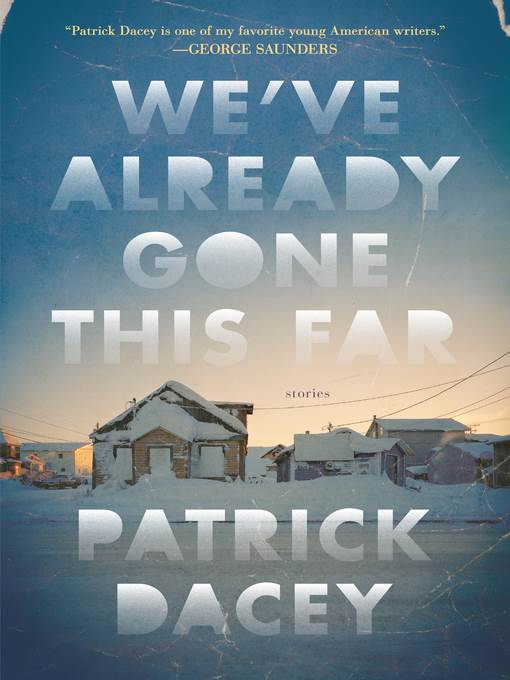
We've Already Gone This Far
Stories
- اطلاعات
- نقد و بررسی
- دیدگاه کاربران
نقد و بررسی

November 30, 2015
Dacey’s debut story collection chronicles the economically and emotionally struggling residents of a Massachusetts town, Wequaquet. Despite the exhausted, drained characters, these tales of neighborly conflicts, professional and personal malaise, and family tragedy are marked by a certain buoyancy. In describing these frustrated lives, Dacey can be as funny as he is compassionate. A retired football coach overzealously guards his gazanias (“Friend of Mine”); a married high school teacher is drawn to an old flame who has become a sexual healer (“Frieda, Years Later”); an alcoholic chaperones his unstable young son on a date (“To Feel Again the Kind of Love That Hurts Something Terrible”); a woman undergoes extensive plastic surgery (“Mutatis Mutandis”). The stories are less lurid and violent than those in Donald Ray Pollock’s Knockemstiff, another promising debut collection about small-town American life, though darkness does creep in: “Bad things will happen. They have to. They’re good for you, anyway,” a father tells his son. There are some hiccups, including “Ballad,” an underwhelming, unpunctuated internal monologue, and “Incoming Mail,” which consists of a mother’s letters to her son fighting in Iraq and strains to capture an unhip parental voice. But taken as a whole, Dacey’s breakout collection shows that small towns can still yield big fictional rewards.

November 15, 2015
Stories of tough times in working-class Massachusetts, where the sons head off to war while the grown-ups left behind confront their aging, impatient selves. Dacey's storytelling is rarely as domesticated as his plots suggest, befitting a young writer who's studied under George Saunders. "Ballad" is told in a single run-on sentence by a songwriter contemplating the way his relationships have shifted as he talks to his newborn baby. In "Frieda, Years Later," a man furtively escapes his family to reunite with a girl he had a fling with in high school, now a yoga instructor in Florida; he anticipates somebody New Age-y and sexually available but winds up with a woman who has his number. Efforts at self-improvement tend to go south quickly: the woman who appears on TV for a whole-body makeover is turned into a narcissistic villain by the show's producers; the father of a teenage boy with mental health issues struggles to prepare him for his first date. Throughout, Dacey is skilled at giving these stories comic moods without mocking the seriousness of his characters' anxieties. The best example, the opening "Patriots," is an irreverent study of the mother of a dead soldier, told from the point of view of an unfriendly neighbor ("she said that my collection of wind chimes drove her nuts, and I said her collection of flags and ribbons drives me nuts"). Two follow-up stories add layers of generosity and pathos to that seriocomic atmosphere. "Incoming Mail" is told in letters from the mother, increasingly at loose ends with family chaos at home and a lack of response from overseas. And the closing "Lost Dog" is a poignant revelation of details of the son's fate and a superb stand-alone story about displaced affection in a war zone. A fine debut collection from a storyteller who improves as the stakes get higher.
COPYRIGHT(2015) Kirkus Reviews, ALL RIGHTS RESERVED.

January 1, 2016
In this debut collection, Dacey offers 13 interlocking stories documenting the lives, loves, and trials of the citizens of Wequaquet, Massachusetts. Throughout the working-class town, Dacey's diverse narrators relate their varied tales. A father takes his autistic son to his first date, a woman seeks fulfillment in televised plastic surgery, a man becomes smitten with a paramour from his youth (now a Florida yoga instructor). In three heartbreaking and closely connected stories, a soldier struggles, a mother mourns, and the Internet fails to connect their worlds. Encountering DUIs, failing marriages, crises of patriotism, and custody disputes, Dacey's characters stumble through domestic life, often uncovering rich moments of humor, hope, and possibility within the darkness. In the keen, observational short-story style of writers such as George Saunders and Lauren Groff, We've Already Gone This Far illuminates both the quotidian details and the profound strangeness of modern American life. Readers will find this set of mournful, biting, and resonant tales united not only by geography but also by Dacey's deep humanity towards his flawed characters.(Reprinted with permission of Booklist, copyright 2016, American Library Association.)




دیدگاه کاربران